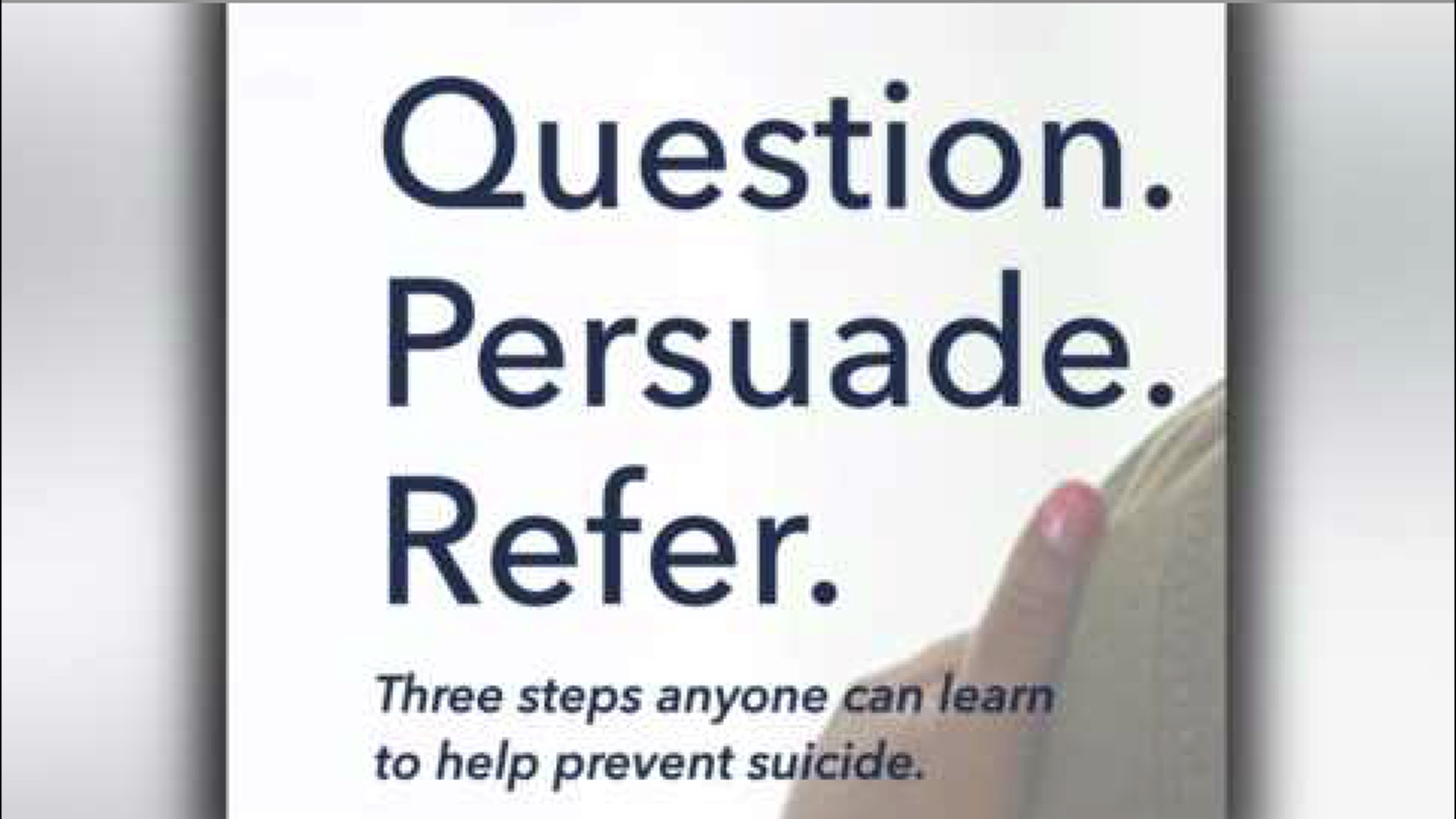DENVER, Pa.-- According to the Center for Disease Control and Prevention (CDC), Pennsylvania's suicide rate has increased by 34% since 1999.
From awareness to prevention, organizations across South Central Pennsylvania are offering a life saving training for community members. They are encouraging people to get the conversation going, and the numbers down.
Govan Martin, The Executive Director of Prevent Suicide PA, said the hardest thing for people is being open and honest, and asking 'are you having thoughts of suicide?'
A life saving training has been designed to get the conversation going, encouraging people to be more open.
Question, persuade, and refer.
These three simple steps are easy enough that anyone can follow them -- to help save a life.
"We want people to look at it in the same way they look at C-P-R... it really teaches folks to have that conversation with someone that's planning suicide or thinking about suicide," said Kim McDevitt, the Executive Director of Mental Health America of Lancaster County.
Just like CPR helps someone catch their breath in a dire instance-- QPR training provides those who need it, with proper instruction to react in a suicide crisis.
Organizations across South Central Pennsylvania offer this life saving course:
"What you're gonna come in with is learning the facts, and the reasons why people are thinking about suicide. Also teaching people how to ask that question and be comfortable about doing it, but also teaching people how to persuade that person to get help," said Martin.
Prevent Suicide PA, and Mental Health America of Lancaster County are just two of the groups offering the training. Both organizations are working towards a goal of debunking myths and informing the public of the real issues surrounding mental health.
"Sometimes the real statistics aren't out there, so we have to make sure we're gathering correct statistics to make sure we're making people aware that not only does suicide exist just with the 2030 in PA or the 47-thousand (in America) but that's just an under estimation," said Martin.
"In Q-P-R we share facts and myths... when I took my Q-P-R training... one of the things I thought about is "if I ask someone if they're thinking about suicide... is it going to be suggestive?" said McDevitt.
The overwhelming amount of people affected by this epidemic -- whether nationally or locally -- have lead officials to do what they can to stop people from taking their own lives.
"They say about 80% of us, and probably a lot more if not all of us have had a passing thought about suicide," said Martin.
According to officials problems even plague those who work in the fields as well.
"One of the struggles we have now is psychiatry so there aren't enough psychiatric services, 70% of those in psychiatry are going to be retiring in the next 10 years," said McDevitt.
Right now, there's a three to six month waiting period just to get an appointment to see a psychiatrist, said Martin.
The most vital thing community members can do is keep an open mind, and talk.
"What we do know with people that have attempted and survive, have always said that they wish they would've never attempted, and they wish they would've given life one more hour, one more day. There's a statistic out there from recent research that says for those who have attempted and lived, with the right medication and the right talk therapy together that there would never be suicide again," said Martin.
Education is key, in the fight against suicide -- so experts say to utilize the resources available throughout the area, like QPR training.
Officials said the feedback they've been getting from their training, that it was helpful.
"It kind of took down their fears or eliminated their fears about having these conversations, it helped them understand more about mental health, mental illness, depression-- and what is really happening inside the mind of someone who might be contemplating suicide," said McDevitt.
So if you, yourself are struggling, do not give up.
"It's not hopeless, if you get the right help that you need odds are, you're gonna have a great life afterwards," said Martin.
If you or someone you know is suffering from depression or suicidal thoughts, talk.
The National Suicide Prevention Hotline is 1-800-273-8255(TALK), and is available 24/7.
The Suicide Prevention Textline is 741-741, and an online chat is also available.
Mental Health America is a hub for all mental health services, and offers multiple branches across South Central Pennsylvania, including in Lancaster and York & Adams County.
Prevent Suicide Pennsylvania also offers multiple mental health resources for those suffering from depression & suicidal thoughts.

